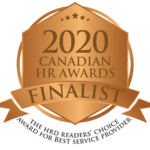Predicting the next twelve months can feel somewhat daunting when reflecting on the year we have just had. That said, employer brand strategy has experienced some monumental shifts in the last few months, and become more recognized as a core component of workplace effectiveness. There has never been a more exciting time to be a part of this culture movement.
The following six themes are important trends that we predict will drive much of the work in employer brand strategy in the year ahead:
EVP Messaging Will Become Much More Personal
The number of companies with employee value propositions (EVPs) grew exponentially in the last year. As a result, it is becoming more and more challenging for companies to build an EVP that truly differentiates from competitors and appeals to the talent they are seeking to connect with. Too often we review EVPs within like industry and see little to no differences in what is being conveyed. To appease all people, corporate guidelines and stakeholders, EVPs are becoming watered down having less impact on the exact person they are trying to sell to. Employers are looking to connect at a more personal level now to gain trust, and preference. There is an understanding that organizations need to be better aligned to the values of the people they seek to serve.
2021 will see a shift beyond the company EVP (umbrella) to expanded and personalized messaging based on role, generation, stage of life and region. To accomplish this, there will be greater focus on external talent research to know talent segments at a deeper level. There will be a greater focus on quantifiable personas, personalized communications, tailored experiences, and recruitment marketing campaigns. Employers will also begin to set KPIs, and track performance analytics tied more to these personalized segments, not just overall employer brand impact.
Corporate Social Justice and Sustainability Will Lead
Employer brand marketers will be compelled to take meaningful stands on social issues in 2021. Today, almost 40% of a brands Share of Voice is directly tied to what employees are discussing online. In the past year hundreds of leaders and name brands were publicly exposed, boycotted and held accountable for inequities this past year. Although there is a renewed expectation from all talent that the corporate social conscious shift dramatically, Gen Z’s are demanding change from employers more than any prior generation.
In a recent Deloitte global study with Millennials and Gen Z, there was a clear indication that social justice will play a major role in determining who their ideal employers are. In fact, nearly three-fourths of respondents said the pandemic has made them more sympathetic toward others’ needs and that they intend to take actions to have a positive impact on their communities. They also will not hesitate to penalize companies whose stated and practiced values conflict with their own.
In fact, 83% of Gen Z candidates said that a company’s commitment to diversity and inclusion is important when choosing an employer.
Employer Brand will need to better align with and amplify DE&I and CSR strategy. Expect to see this work included in the EVP and talent research efforts, brand concept development, activation strategy, media campaigns, recruitment materials, candidate, and employee experience programs. Organizations that fail to blend DE&I, CSR, and Employer Brand in 2021, risk not only losing talent to competition but also losing potential customers and market share.
Agile and Remote Cultures
The pandemic and remote work forced organizations to change the employee experience on at a moments notice. Corporate cultures have become virtual meeting environments, with technology driven process shifts, and massive efforts to drive innovation. Front line talent has faced increased risk, erratic hours, fluctuating policies, and less stability. 2020 was a year where everyone did what they could to make the new world of work succeed.
Unfortunately, the employer brand and culture were a victim in this shift. Where employers could previously describe a culture by the design and energy in an office, by the body language in an elevator, a passing laugh with a manager, or a leader’s open door, today we define the culture based on the online experiences and connections in the day.
In our current world, company cultures are experienced not only by your employees and candidates being interviewed, but by their family members (who overhear team meetings). Your culture is now described by how effectively employees can balance personal obligations and work commitments in the home. 2021 will focus much more on branding and improving the employee experience. Engagement is at an all time low, mental health crisis an all time high, and according to our recent North American talent survey, close to 50% of employees are open to a new job in the year ahead.
In 2021 expect to see more Culture and Organizational Design leaders involved in the Employer Brand strategy development. For a company wishing to derive impactful engagement, retention and loyalty results, these roles will be critical to activate and implement change.
For many organizations, the investment in internal activation and experiential programs will take priority. We will also see much more personalized and persona- based talent experience programs, as well as mentoring, recognition, and rewards programs. Noting that stage of life, generational and personal living situations will continue to play a significant role in how culture and work is experienced, customized experiences and flexible options will become more important than ever.
Amplifying the Story
Many people think the purpose of an employer brand is to recruit talent. This is simply not true. A well-designed employer brand story allows both employees and external talent to immerse themselves in the workplace culture, and personal affiliation first. The job posting comes second. Consistently the companies that are named as the top employer brands and most preferred amongst talent, have done so not be just marketing their job openings, but telling compelling stories about why working there is the most exciting and impactful experience possible. Google, Tesla, Disney, Apples and Adidas have done a brilliant job of embedding a clear and inspirational vision of what a life and career would be like in their organization.
Today, it is harder than ever to capture talent’s interest. In an era of shortened attention spans, increased volumes of content, and digital noise, a careers site and once-per-week LinkedIn post is not enough to make any measurable impact.
2021 is ripe for change. Even the dream companies listed above will see turnover as people seek more meaning in their lives. As more and more employers compete for the same technical talent pool, a focused investment on amplifying the message and launching ad campaigns and remarketing efforts will be critical to the next few years of business transformation. Employer Brand leaders need to think about investing in solutions that help them show up in new feeds, stand out to new talent, and compel this talent group to seek you out and follow you.
Gig Workers Matter
Historically, employers have considered gig and temporary workers to be short term assets hired to get a specific project done. Culture, engagement, experience did not matter. In fact, for many large organizations, their efforts to avoid deemed employment have led procurement and sourcing oversight on this talent pool, not Human Resources. Yet here we are, facing down 2021 with more CEOs indicating they plan on using gig workers vs full time employees in the years to come. More talent is seeking out temporary and contract assignments vs full time jobs to better align with personal values and independence. This forgotten pool of talent experience and comment on your employer brand and workplace culture with equal fervor. They will recommend you as a place to work or do business with OR they will disparage you in talent communities you wish to employ.
Gig workers have a clear experience and view of your workplace culture regardless of how little you include them. The candidate and interview experience, the onboarding experience, the leadership, and team dynamic, and their effort to help you achieve the company vision is equally valid.
2021 will see more employers researching and building Gig Work Value Propositions. They will seek to understand and enhance their work experiences and promote more opportunities in the recruitment marketing efforts. Expect to see more clearly defined careers landing pages, gig worker storytelling and experiential improvements.
If You Do Not Measure, Your Work Will Not Matter.
It is astounding how few organizations in 2020 still struggle to measure the impact and value of their employer branding work. In fairness, HR tends to have a multitude of disparate systems. This challenge is enhanced with global and multi brand companies. Talent acquisition leads often struggle to capture monthly analytics on new applicants, careers site visits, social media impact or ad spend impact.





